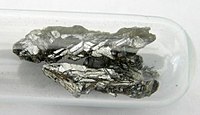
Photo from wikipedia
Abstract Vanadium (V) in soils exerts toxic effects on human health. To develop a plant–microorganism combined remediation strategy for V-contaminated soil, pot experiments were conducted with alfalfa (Medicago sativa L.)… Click to show full abstract
Abstract Vanadium (V) in soils exerts toxic effects on human health. To develop a plant–microorganism combined remediation strategy for V-contaminated soil, pot experiments were conducted with alfalfa (Medicago sativa L.) and V-resistant bacterial strain Arthrobacter sp. 5k4-8-1 in different levels of V-contaminated soil. At 500 mg kg − 1 spiked V(V), alfalfa survived only in the soils inoculated with high-level bacterial strain (1010 CFU mL − 1 , 15 mL), indicating that strain 5k4-8-1 worked effectively on alleviating the stress of V on plant growth. Compared with non-inoculated controls, the V accumulation in alfalfa plants was increased conspicuously by inoculation of strain 5k4-8-1. After the remediation process by the combination of strain 5k4-8-1 and alfalfa, the proportion of V(V) in total V decreased in all soils, indicating that the strain may possess a mechanism of reducing V(V) to V(IV). Moreover, the strain 5k4-8-1 led to an obvious reduction of soil V bioavailability and mobility in inoculation treatments. These results provide insights into the plant–microorganism combined bioremediation of V-contaminated soil.
Journal Title: Environmental Technology and Innovation
Year Published: 2020
Link to full text (if available)
Share on Social Media: Sign Up to like & get
recommendations!